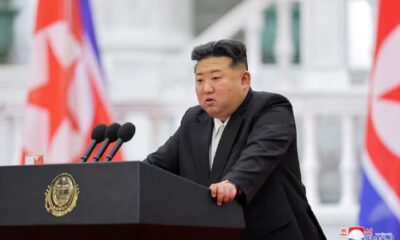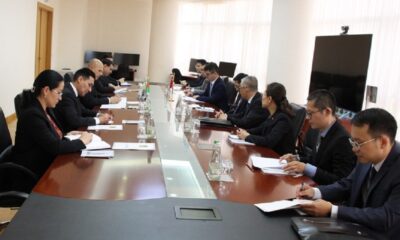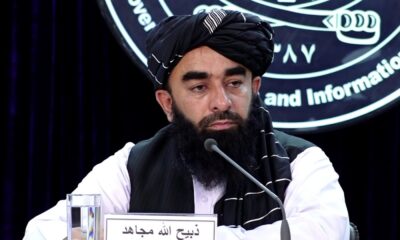World
N. Korea launches missiles from submarine as US-South Korean drills begin
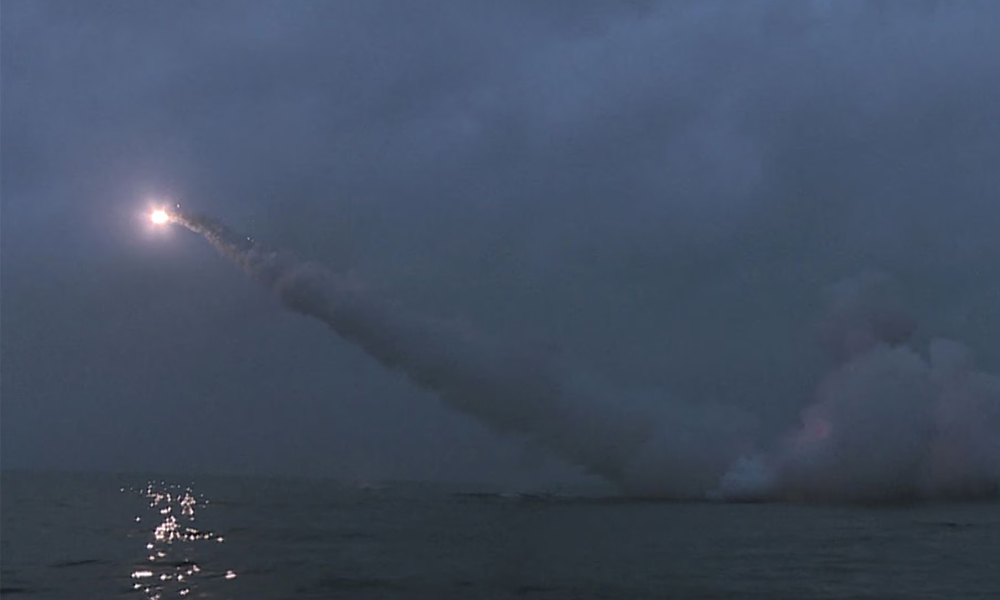
Nuclear-armed North Korea test-fired two strategic cruise missiles from a submarine on Sunday, state news agency KCNA said on Monday, just as US-South Korea military drills were due to begin, Reuters reported.
"Strategic" is typically used to describe weapons that have a nuclear capability.
KCNA said the launch confirmed the reliability of the system and tested the underwater offensive operations of the submarine units that form part of North Korea's nuclear deterrent.
South Korea's Joint Chiefs of Staff (JCS) said the military was on high alert and the country's intelligence agency was working with its US counterpart to analyse the specifics of the launch.
On Monday, South Korean and American troops were scheduled to begin 11 days of joint drills, dubbed "Freedom Shield 23," which will be held on a scale not seen since 2017, read the report.
The drills will strengthen the allies' combined defensive posture, the two militaries have said, and will feature field exercises including amphibious landings.
North Korea has long bristled over drills it regards as a rehearsal for invasion. It has conducted a record number of missile tests and drills in the past year in what it says is an effort to boost its nuclear deterrent and make more weapons fully operational.
"It's very regretful that North Korea is using our regular, defensive drills as a pretext for provocation," said Koo Byoung-sam, spokesperson for South Korea's unification ministry handling relations with the North. "I hope North Korea realises that there is nothing they can earn from escalating tensions on the Korean peninsula."
The submarine launches aimed to show North Korea's determination to control a situation in which, KCNA said, "the US imperialists and the south Korean puppet forces are getting evermore undisguised in their anti-DPRK military manoeuvres."
DPRK stands for North Korea, officially the Democratic People's Republic of Korea.
KCNA said the strategic cruise missiles were fired from the "8.24 Yongung" submarine in the water off the east coast of Korea in the early hours of Sunday, Reuters reported.
The missiles travelled some 1,500 kilometres (932 miles) before hitting a target in the sea, the KCNA report said.
A JCS spokesperson said not everything North Korea claimed was accurate, but he did not give further details.
Japan's Chief Cabinet Secretary Hirokazu Matsuno said there was no information that the missile flew toward Japan's waters or caused any damage.
"If North Korea's announcement that the missile had a range of more than 1,500 kilometres was true, it would pose threats to the region's peace and stability – we are concerned," Matsuno said.
He said US military deterrence in Asia-Pacific is "essential" in the region, adding the North "may step onto further provocative acts such as a nuclear test."
Leif-Eric Easley, a professor at Ewha University in Seoul, said North Korea could be exaggerating its capability to arm such missiles with nuclear warheads, read the report.
"The Kim regime wants to show it can match or surpass military capabilities on display during US-South Korea defence exercises. Yet the reality is North Korean soldiers are poorly fed and are being ordered to help farmers address the country’s food shortage," Easley said.
North Korea has a large submarine fleet but the 8.24 Yongung (August 24th Hero) is its only known experimental ballistic missile submarine. Analysts say it plays a critical role in the development of missiles, submarine technology and operational procedures, as well as hands-on training of new submariners.
North Korea has said it is building an operational ballistic missile submarine, Reuters reported.
While overseeing a short-range ballistic missile (SRBM) launching exercise on Thursday, North Korean leader Kim Jong Un ordered the military to intensify drills to deter and respond to a "real war" if necessary.
On Sunday state media reported that Kim led a ruling party meeting to discuss and decide on "important, practical measures" to boost the country's war deterrence in the midst of stepped-up actions by the United States and South Korea. The report did not provide specifics on the measures.
World
North Korea’s Kim accuses US of stoking tension, warns of nuclear war

North Korean leader Kim Jong Un has accused the United States of ramping up tension and provocations, saying the Korean peninsula has never faced a greater risk of nuclear war, state media KCNA said on Friday.
The comments came amid international criticism over increasingly close military co-operation between Pyongyang and Moscow, and assertions that North Korea sent more than 10,000 troops to Russia to support its invasion of Ukraine, Reuters reported.
Previous negotiations with Washington have only highlighted its "aggressive and hostile" policy toward North Korea, Kim said in a speech at a military exhibition in Pyongyang, the capital, the KCNA news agency said.
"Never before have the warring parties on the Korean peninsula faced such a dangerous and acute confrontation that it could escalate into the most destructive thermonuclear war," he said on Thursday.
"We have already gone as far as we can on negotiating with the United States," he said, adding that the talks had only shown its aggressive and hostile policy toward North Korea could never change.
North Korean state media have not yet publicly mentioned the re-election of Donald Trump, who held three unprecedented meetings with Kim during his first term, in Singapore, Hanoi, and at the Korean border, in 2018 and 2019.
But their diplomacy yielded no concrete outcome due to the gap between U.S. calls for North Korea to abandon its nuclear weapons and Kim's demands for sanctions relief.
Trump has long touted his ties with Kim, saying last month the two countries would have had "a nuclear war with millions of people killed", but he had stopped it, thanks to his ties with the North's leader.
Hong Min, a research fellow at the Korea Institute for National Unification in Seoul, said Kim could be trying to underscore the North's nuclear capabilities ahead of Trump's second term, while leaving the door open for diplomacy.
"He might be suggesting Trump should show his 'willingness to co-exist' before re-opening any talks and calling for a change in the U.S. hostile attitude," Hong said.
MILITARY EXHIBITION
Kim also called for developing and upgrading "ultra-modern" versions of weaponry, and vowed to keep advancing defence capabilities to bolster the North's strategic position, KCNA said.
Strategic and tactical weapons were on display at the event, called the Defence Development Exhibition.
KCNA pictures showed the Hwasong-19 and 18 intercontinental ballistic missiles, the Chollima-1 rocket used in a successful satellite launch in November 2023, and the Saetbyol-9 multi-purpose attack drone, which resembles the U.S. Reaper.
Hong said the pictures also included several weapons needed by or presumed to already have been supplied to Russia for its war in Ukraine, such as 240mm multiple rocket launchers, self-propelled howitzers, anti-tank systems and drones.
North Korea has shipped additional arms to Russia, the South's lawmakers said on Thursday, after being briefed by the national intelligence agency.
Last year, when he was defence minister, Russian Security Council Secretary Sergei Shoigu accompanied Kim to a defence fair that showcased missiles and weapons.
Last week, Kim urged the North's military to improve its war-fighting capabilities, blaming the United States and its allies for stoking tension to "the worst phase in history" and calling the Korean peninsula "the world's biggest hotspot".
World
ICC issues arrest warrants for Israel’s Netanyahu, Gallant and Hamas leader
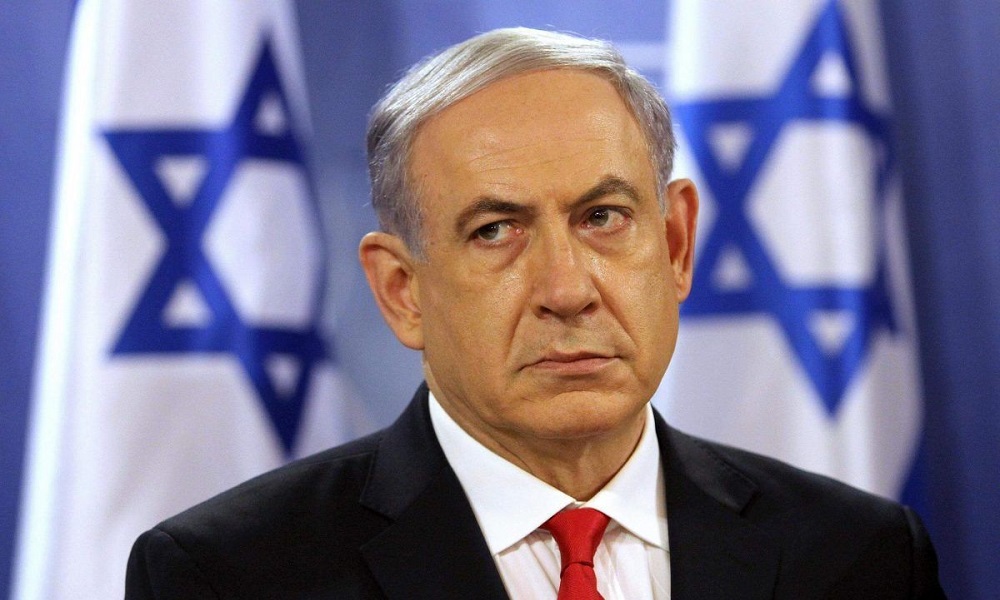
Judges at the International Criminal Court have issued arrest warrants for Israeli Prime Minister Benjamin Netanyahu and his former defence chief, as well as a Hamas leader, Ibrahim Al-Masri, for alleged war crimes and crimes against humanity, Reuters reported on Thursday afternoon.
The move comes after the ICC prosecutor Karim Khan announced on May 20, that he was seeking arrest warrants for alleged crimes connected to the Oct.7, 2023 attacks on Israel by Hamas and the Israeli military response in Gaza.
The ICC said Israel's acceptance of the court's jurisdiction was not required.
Israel has rejected the jurisdiction of the Hague-based court and denies war crimes in Gaza.
Israel has said it killed Al-Masri, also known as Mohammed Deif, in an airstrike but Hamas has neither confirmed nor denied this.
World
US vetoes UN Security Council resolution on Gaza ceasefire

The United States on Wednesday vetoed a U.N. Security Council resolution for a ceasefire in Gaza, drawing criticism of the Biden administration for once again blocking international action aimed at halting Israel's war with Hamas.
The 15-member council voted on a resolution put forward by 10 non-permanent members that called for an "immediate, unconditional and permanent ceasefire" in the 13-month conflict and separately demanded the release of hostages, Reuters reported.
Only the U.S. voted against, using its veto as a permanent council member to block the resolution.
Robert Wood, deputy U.S. ambassador to the U.N., said Washington had made clear it would only support a resolution that explicitly calls for the immediate release of hostages as part of a ceasefire.
"A durable end to the war must come with the release of the hostages. These two urgent goals are inextricably linked. This resolution abandoned that necessity, and for that reason, the United States could not support it," he said.
Wood said the U.S. had sought compromise, but the text of the proposed resolution would have sent a "dangerous message" to Hamas that "there's no need to come back to the negotiating table."
Israel's campaign in Gaza has killed nearly 44,000 people and displaced nearly all the enclave's population at least once. It was launched in response to an attack by Hamas-led fighters who killed 1,200 people and captured more than 250 hostages in Israel on Oct. 7, 2023.
Members roundly criticized the U.S. for blocking the resolution put forward by the council's 10 elected members: Algeria, Ecuador, Guyana, Japan, Malta, Mozambique, South Korea, Sierra Leone, Slovenia and Switzerland.
"It is deeply regretted that due to the use of the veto this council has once again failed to uphold its responsibility to maintain international peace and security," Malta's U.N. Ambassador Vanessa Frazier said after the vote failed, adding that the text of the resolution "was by no means a maximalist one."
"It represented the bare minimum of what is needed to begin to address the desperate situation on the ground," she said.
Food security experts have warned that famine is imminent among Gaza's 2.3 million people.
U.S. President Joe Biden, who leaves office on Jan. 20, has offered Israel strong diplomatic backing and continued to provide arms for the war, while trying unsuccessfully to broker a ceasefire deal between Israel and Hamas that would see hostages released in exchange for Palestinians held by Israel.
After blocking earlier resolutions on Gaza, Washington in March abstained from a vote that allowed a resolution to pass demanding an immediate ceasefire.
A senior U.S. official, who briefed reporters on condition of anonymity ahead of Wednesday's vote, said Britain had put forward new language that the U.S. would have supported as a compromise, but that was rejected by the elected members.
Some members were more interested in bringing about a U.S. veto than compromising on the resolution, the official said, accusing U.S. adversaries Russia and China of encouraging those members.
'GREEN LIGHT'
France's ambassador Nicolas de Riviere said the resolution rejected by the U.S. "very firmly" required the release of hostages.
"France still has two hostages in Gaza, and we deeply regret that the Security Council was not able to formulate this demand," he said.
China's U.N. ambassador, Fu Cong, said each time the United States had exercised its veto to protect Israel, the number of people killed in Gaza had steadily risen.
"How many more people have to die before they wake up from their pretend slumber?" he asked.
"Insistence on setting a precondition for ceasefire is tantamount to giving the green light to continue the war and condoning the continued killing."
Israel's U.N. ambassador Danny Danon said ahead of the vote the text was not a resolution for peace but was "a resolution for appeasement" of Hamas.
"History will remember who stood with the hostages and who abandoned them," Danon said.
-

 Sport4 days ago
Sport4 days agoAbu Dhabi’s thrilling T10 tournament just days away
-

 World4 days ago
World4 days agoBiden allows Ukraine to use US arms to strike inside Russia
-

 Sport4 days ago
Sport4 days agoAfghanistan beat UAE by 169 runs in U19 tri-series
-

 Latest News3 days ago
Latest News3 days agoTajikistan trumps Afghanistan 3-1 in football friendly
-
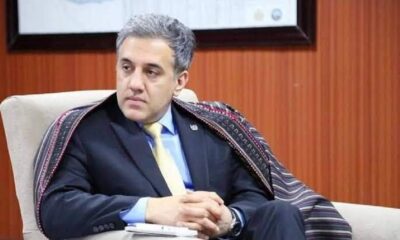
 Latest News4 days ago
Latest News4 days agoTwo Afghan diplomats posted to Germany under former government resign
-
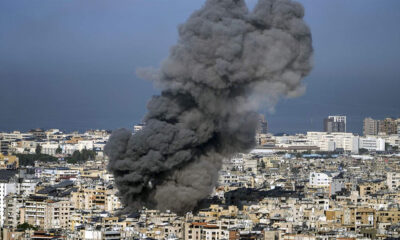
 World3 days ago
World3 days agoLebanon, Hezbollah agree to US proposal for ceasefire with Israel, Lebanese official says
-
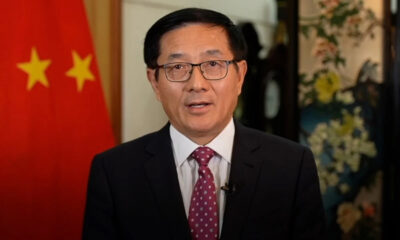
 Latest News4 days ago
Latest News4 days agoChina’s envoy says Beijing never interferes in Afghanistan’s internal affairs
-

 Latest News4 days ago
Latest News4 days agoSaudi Arabia executed 101 people, including three Afghans this year


